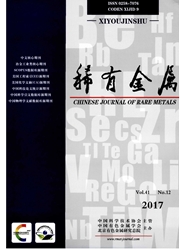

 中文摘要:
中文摘要:
新能源汽车的迅速发展,促进了对车载储能材料的需求和研究。钛铁基储氢合金具有室温吸放氢,可逆储氢量高,工作温区广,环保无污染,原材料成本低等特点。其不仅可以通过电化学反应实现氢的贮存,还可以直接与气态氢反应形成金属氢化物,是混合动力汽车、纯电动汽车、氢燃料电池以及氢内燃机汽车车载储能系统的重要材料。本文针对现有新能源汽车类型,介绍了主要的车载储能技术,包括:电化学储能(锂离子蓄电池、镍氢蓄电池、铅酸蓄电池)、高压储罐储能、低压储罐储能等。详细介绍了上述储能技术的工作原理,并论述了其在车载储能系统中应用的优势和不足。通过对比现有的车载储能技术,系统分析了钛铁基储氢合金在新能源汽车储能系统中应用的优势和前景,提出了需要重点改善的性能,包括:活化性能,抗毒化性能和电化学容量等,并总结了国内外相关的研究进展。
 英文摘要:
英文摘要:
The rapid development of new energy vehicles promotes the demand and research for the vehicle energy storage materials. TiFe-based hydrogen storage alloys have characteristics such as hydrogen absorption and desorption ability at room temperature, high reversible hydrogen storage capacity, wide operational temperature range, environmental protection, low raw material cost and so on. They not only can storage hydrogen by electrochemical reactions, but also can react with gaseous hydrogen directly and form metal-hy- drides, which are important materials of vehicle energy storage equipment for the hybrid electric vehicles, electric vehicles, hydrogen fuel-cell powered and burning hydrogen in internal combustion engines vehicles. This paper reviewed the main vehicle energy storage technologies including electrochemical energy storage (lithium-ion battery, nickel-hydrogen battery and lead-acid battery), high-pres- sure container energy storage and low-pressure container energy storage technologies for the existing type new energy vehicles. The working principle of the above energy storage technologies were introduced in detail, and the advantages and disadvantages of them for applying in vehicle energy storage system were discussed. By comparing the existing vehicle energy storage techniques, this paper ana- lyzed the application superiority and prospect of the TiFe-base alloys in the field of vehicle energy storage systematically, brought for- ward the performances need to be improved, such as the active performance, the anti-poisoning performance and the reversible electro- chemical capacity, and summarized the domestic and international related research progress.
 同期刊论文项目
同期刊论文项目
 同项目期刊论文
同项目期刊论文
 期刊信息
期刊信息
